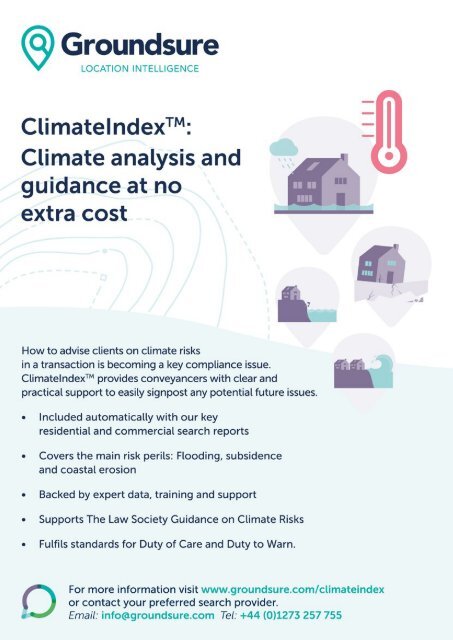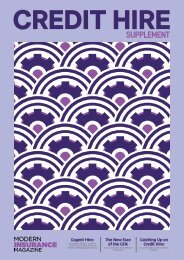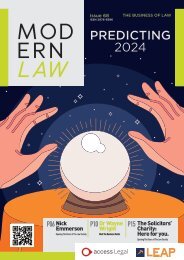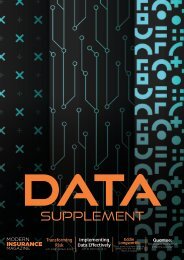Modern Law Magazine Issue 67
You also want an ePaper? Increase the reach of your titles
YUMPU automatically turns print PDFs into web optimized ePapers that Google loves.
FORUM<br />
What are some ways conveyancers<br />
can encourage clients to opt for<br />
digital documentation and signatures<br />
to minimise printing and mailing?<br />
Mike: Conveyancers can encourage clients to opt for digital<br />
documentation and signatures to minimise printing and mailing in<br />
several ways. Firstly, they can emphasise the convenience and timesaving<br />
benefits of digital transactions, highlighting how it expedites<br />
the process and reduces paperwork. Secondly, they can assure clients<br />
of the security and legality of digital signatures, explaining the robust<br />
encryption and authentication measures in place. Offering step-bystep<br />
guidance on how to electronically sign documents can streamline<br />
the process for clients who may be unfamiliar with it. Furthermore,<br />
Conveyancers can discuss the environmental impact and cost savings<br />
associated with reduced paper usage and postage. By educating<br />
clients about the practical advantages and environmental benefits<br />
of being digital, Conveyancers can encourage Client to adopt these<br />
efficient, eco-friendly practices as a way of life.<br />
David: I mentioned Docusign and similar digital agreement<br />
formats already, but ensuring that all searches, maps and<br />
supporting documentation is collated, inputted and stored and<br />
then subsequently signed by all relevant parties electronically saves<br />
on paper, postage, time - and it enables all stakeholders to receive<br />
the same information and status updates at the same time.<br />
Some clients may be reluctant initially to use these new formats,<br />
but there is a new generation of homebuyers and business owners<br />
who are digital natives and the shift to full digitisation is only a<br />
matter of time. Those firms that adapt now can manage costs, be<br />
more efficient, reducing the time for unnecessary manual tasks<br />
and free up the opportunity to focus on the client.<br />
Paul: Digital signatures and documentation can save a lot of time<br />
and cost as well as protecting both the conveyancer and the clients<br />
which supports the environmental and sustainable policies of the<br />
business. In general, the adoption of such processes is positively<br />
received however wider adoption is needed and requires education<br />
and understanding to be widely adopted. The use of user-friendly<br />
tools will considerably improve the uptake from clients whilst<br />
emphasising the security and protection that the systems afford<br />
to clients. Clients can be concerned as to the legal validity of<br />
electronic signatures so therefore it is helpful to be able to point to<br />
evidence of acceptance by authorities and regulated entities.<br />
One of the most important factors to any client in a transaction<br />
is cost therefore the security and cost savings go hand in hand as<br />
an encouragement to clients to adopt the processes. It may also<br />
be possible to offer incentives to clients who utilise the digital<br />
opportunities that you are able to offer them.<br />
What challenges do conveyancers<br />
face in transitioning to digital<br />
platforms for document<br />
management and communication?<br />
Mike: Conveyancers encounter several challenges in<br />
transitioning to digital platforms for document management<br />
and communication. First and foremost, there is a learning curve<br />
associated with adopting new technologies, which may require<br />
training for both staff and clients. Ensuring that all parties<br />
involved in a transaction are willing and able to adapt to digital<br />
processes can be a challenge. Integrating digital solutions into<br />
existing workflows and systems can also be complex and timeconsuming.<br />
The cost of implementing and maintaining digital<br />
platforms can be a significant hurdle for smaller conveyancing<br />
firms. Technical issues, such as software glitches or network<br />
failures, may disrupt operations and potentially lead to delays in<br />
property transactions. Despite these obstacles, the benefits of<br />
transitioning to digital platforms, including increased efficiency,<br />
reduced environmental impact, and improved client service, make<br />
it a worthwhile venture for Conveyancers.<br />
Thomas: To understand the challenges Conveyancers, face here,<br />
perhaps it’s prudent to first consider the key driver for considering<br />
a transition to digital platforms for document management and<br />
communication.<br />
Digital platforms remove historic accessibility and communication<br />
barriers. Documents can be stored in the cloud, making it possible<br />
to collaborate on them in real time with colleagues, clients and<br />
other third parties, virtually from any place with internet access.<br />
Digital solutions also facilitate ease of sharing and transparent<br />
communication exchange. This promotes effective stakeholder<br />
engagement and significantly reduces transaction times.<br />
However, this ease of access brings in a number of risks associated<br />
with data security. Conveyancers are commonly targeted by cyber<br />
criminals, and it has never been more challenging for law firms<br />
to ensure their systems and cybersecurity measures are robust<br />
enough to sustain a sophisticated attack that may compromise<br />
their clients’ data.<br />
At tmgroup, we strive to make it easier for conveyancers to use<br />
our digital platforms by securely integrating our services with other<br />
existing systems law firms use. Our latest integration with iManage<br />
Work 10, one of the leading secure document management<br />
systems, as well as our ISO27001 accreditation, are a testament<br />
to our unconditional commitment for ensuring security of our<br />
customers’ data.<br />
Requesting feedback can be a useful way of providing reassurance<br />
to clients that not only do the systems work but they are also<br />
popular and effective.<br />
61
















